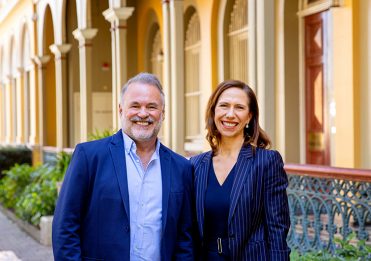‘Education is not the learning of facts, but the training of minds to think.’
Albert Einstein, 1921
When Albert Einstein made this statement during a visit to Boston in 1921, he argued that the value of a school or college education is to train the mind to think something that cannot be learned from textbooks—’to create the capacity of integrated understanding, and an ability to use the knowledge intelligently’ (Tata, 2019). More than 100 years later, these tenets of education—critical thinking, curiosity, principled behaviour—remain fundamental.
Regardless of your religion, your beliefs or your ‘side of the aisle’, the goal of education must always be to prepare those in our care to contribute meaningfully to a more just world. Countless studies have shown that education is the cornerstone that advances society: educated people are proven to live longer, be happier and cope better with the stresses of life (Why Education Matters to Health: Exploring the Causes, 2015). Perhaps most importantly, an educated person is more empowered. Education instils in us the confidence to stand up for ourselves, improves our reasoning and decision-making capabilities, makes us mobile, and gives us access to social networks that might not otherwise be attainable (Iyer, 2016).
History has shown, time and again, that society needs ‘trained minds’ to solve current challenges, predict those of the future, and lay the groundwork for innovation. According to Mission Australia’s 2021 Youth Survey of 20 000 young Australians, the biggest challenges they foresee are the long-term impacts on health, wellbeing and education as a result of COVID-19, followed closely by the climate change crisis, and concerns about equity and discrimination within society (Annual Youth Survey | Mission Australia, 2021). Such complex societal issues cannot be solved by a single person, company, government or institution. They require collective thinking and community action. While the solutions cannot be found in a textbook, the role of educational institutions in addressing these concerns is paramount.
Despite frequent media commentary questioning the value of educational institutions, without these quintessential ‘homes of the mind’ it would be infinitely harder, if not impossible, to achieve societal progress, advancement, innovation. Beyond the development of fundamental attributes in the individual (which benefit the collective), schools and universities seek to advance society through research, and offer strong thought leadership on current issues and trends, free from corporate and political structures and hierarchies. The importance of this is reflected in surveys of public trust, with schools and universities viewed consistently as safe and non-biased sources of information (Connell, 2022). In the words of Professor Deborah Terry, Vice-Chancellor and President of The University of Queensland:
‘Our universities are places where freedoms of thought and speech are founding ideals that pervade all that we do. They are places of knowledge, critique and dialogue. Places where understanding, ideas and perspectives are shaped—and then re-shaped—by facts, evidence, open debate and deep reflection. In this way, our universities serve to strengthen our democracy and ensure that we—as individuals, as communities, as a nation and as humanity—have the conviction and the courage to confront the big challenges that lie ahead of us.’ (Terry, 2020)
As Professor Terry asserts, the contributions of educational institutions extend beyond intellectual, academic, and scientific progress. Returning to the ‘training of the mind’ concept, schools, and universities also ‘train’ us to belong to a community in a way that few others can. The years we spend in secondary school and at university are formative—they help us to cement our place in the world. During this time, we explore what we like, and what we don’t—we learn who we are. These institutions teach us how to contribute to the world in a way that is positive, and how to develop relationships with our peers and educators that are mutually beneficial. They expose us to people outside of our family and friendship circles—allow us to learn about family structures and customs that are different to our own—and introduce us to other cultures and views of the world.
In considering the three most pressing concerns for Australia’s youth—the effects of the pandemic, climate change and equality—schools and universities are already addressing all three. Academics are researching current and predicted future impacts of the COVID-19 pandemic which will no doubt inform public policy. Schools have given students a sense of the ‘known’, a belonging, during the pandemic—not to mention adapting to the continual shifts in and out of remote learning to minimise disruption to students’ learning. Universities and their research departments have pioneered sustainability initiatives (White, 2021), climate change policy and international summits, and encouraged the voice of young people to be heard locally and globally (Watts, 2019). Education is also imperative in the attainment of equality and inclusivity: it is essential to individual and national development.
It’s universally agreed that schools and universities are places to learn. They are unquestionably ‘homes for the mind’, but they are so much more than this. Educational institutions are places for testing of ideas, conducting research, understanding and explaining trends, promotion and progress of knowledge—they are a protection from ignorance. They are places that train our minds to think, and most importantly, they are environments that have the power to unite communities—harnessing support and inspiring action for current and future challenges. Now more than ever, we need this expertise, we need this humanising experience.
References:
- Annual Youth Survey | Mission Australia. (2021). Retrieved February 10, 2022 from https://www.missionaustralia.com.au/what-we-do/research-impact-policy-advocacy/youth-survey
- Connell, R. (2022). Remaking universities: Notes from the sidelines of catastrophe. The Conversation. https://theconversation.com/remaking-universities-notes-from-the-sidelines-of-catastrophe-175920
- Iyer, Shweta. (2016, Feb 24). What are the 7 ways education can power a better world? KnowledgeHut. Retrieved February 10, 2022 from https://www.knowledgehut.com/blog/learning/educati on-powers-better-world
- Tata, Manasi. (14 August 2019). Education is not the learning of facts, but the training of minds to think. United Nations in India. https://in.one.un.org/education-is-not-the-learnin g-of-facts-but-the-training-of-minds-to-think/
- Terry, Deborah. (2020, August 26). Facts, Evidence and Discovery: The vital role of our universities in pandemic recovery. King’s College. St Lucia, Queensland, The University of Queensland. https://about.uq.edu.au/vice-chancellor/speeches/f acts-evidence-and-discovery-vital-role-our-universities-pandemic-recovery
- Terry, Deborah, & Jackson, Catriona. (2020, April 7). The crucial role of universities in a coronavirus recovery [Higher Education]. The Australian. https://www.theaustralian.com.au/higher-education/ the-crucial-role-of-universities-in-a-coronavirus- recovery/news-story/e6bcc09b0969aa5a4b38bceda012b6 c7
- White, R. (2021). This is how universities can lead climate action. The Conversation. https://theconversation.com/this-is-how-universities-can-lead-climate-action-147191
- Watts, J. (2019). Climate change science pioneer Wallace Smith Broecker dies. The Guardian. https://www.theguardian.com/science/2019/feb/19/climate-change-science-pioneer-wallace-smith-broecker-dies
- Why Education Matters to Health: Exploring the Causes. (2015) [Webpage and brief]. Virginia Commonwealth University. https://societyhealth.vcu.edu/work/the-projects/why-education-matters-to-health-exploring-the-causes.html



